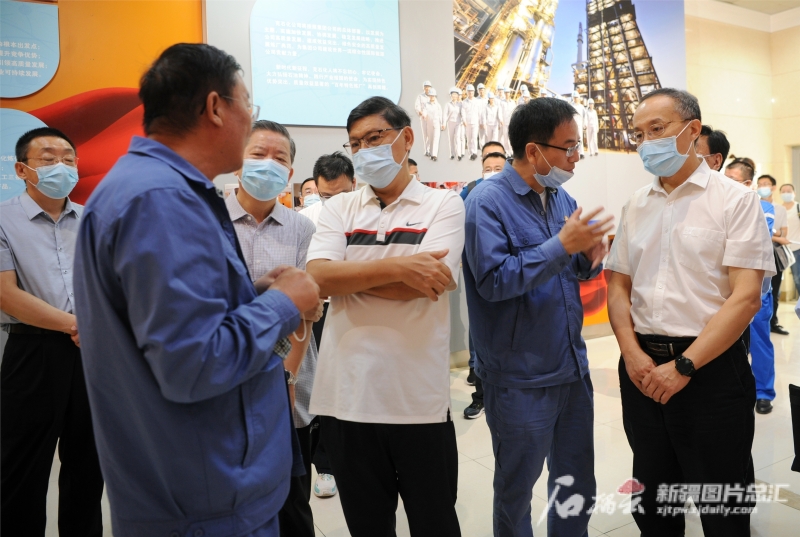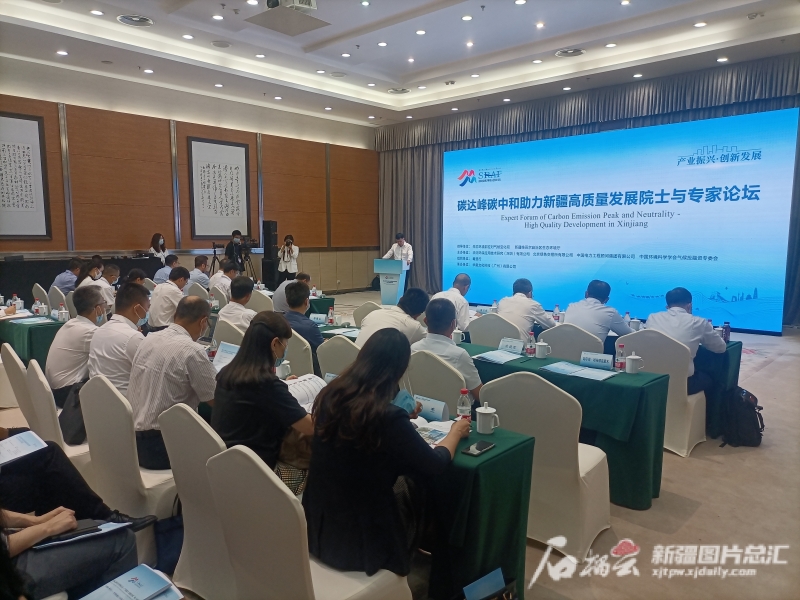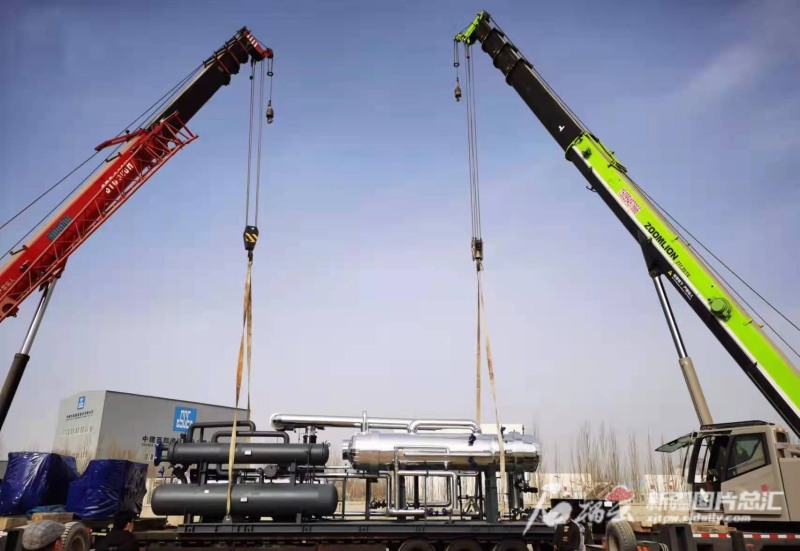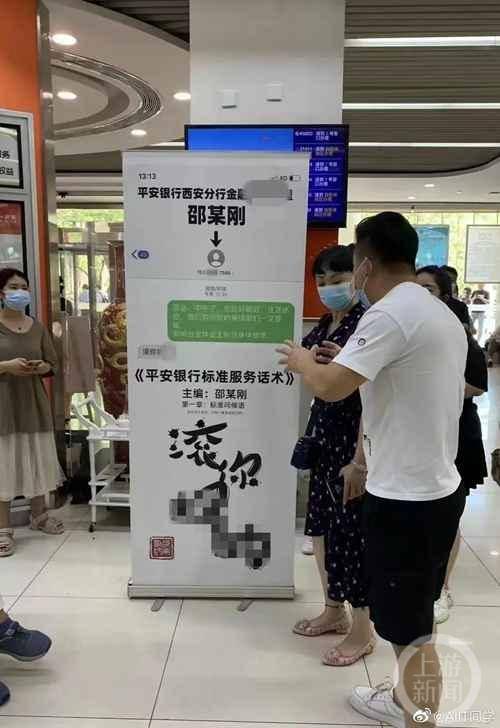Tianshan Observation 丨 Implement the "double carbon" goal to promote industrial upgrading
Author:Tianshan.com Time:2022.07.20
Implement the "double carbon" goal to promote industrial upgrading
——The opportunity in Xinjiang in the eyes of academicians ①
Reporter Yu Jiangyan
The "dual carbon" goal is not a "tight curse" for Xinjiang, but it is a new opportunity to achieve high -quality development.
Since July, Xinjiang Green Mining Development Academician Forum, "Academician Xinjiang" event, "Core District of the Silk Road Economic Belt -Industrial Revitalization and Innovation Development" Academician Forum was successively held. Scholars gathered in Xinjiang to plan for the high -quality development of Xinjiang's economy and society.
Petroleum petrochemical and coal and coal chemical industry are the key development industries in Xinjiang. Focusing on the clean and efficient utilization of energy in Xinjiang, academicians and experts made suggestions from different perspectives.
Extend the industrial chain high -quality development
Black thick oil, using a complete set of processing technology, was processed into food -grade white oil at Petroleum Caramay Petrochemical Co., Ltd. (hereinafter referred to as Kerbal Petrochemical). In the end, after these white oils were sold to the southern cosmetics manufacturers, they became high -end cosmetics basic oils such as lipstick and moisturizing cream.

On July 15, academicians and experts visited the Caramay Petrochemical Co., Ltd. to visit the investigation. Reporter Qin Meihua Photo
On July 15th, during the Cocvatament survey, academicians and experts fully affirmed the development ideas of Cocon to use the unique resources of Xinjiang oil fields to take different resources. "In the future, Cetalization can also cooperate with the domestic advantage scientific research institutes to form an innovation chain in the south and form an industrial chain in Xinjiang." Yang Weimin, an academician of the Chinese Academy of Engineering, suggested.
Xinjiang is one of the seven coal chemical bases in China. In recent years, the transformation technology of coal has continued to make breakthroughs, and has been made into gas, oil, methanol, and olefins. In Yili Kazakh Autonomous Prefecture, Xinjiang Qinghua Energy Group Co., Ltd. and Yili Xintian Coal Chemical Co., Ltd. made coal into natural gas and continuously transported to Zhejiang, Shandong, Henan and other places through the Western Gas East Pure Network. "Relative to coal, the current situation of China is less oil and less gas, and transforming rich coal resources into the urgent need of oil and gas in the country is essential to ensure national energy security." It is said that the development of the coal chemical industry in Xinjiang is of great significance.
Focusing on the national "three bases and one channel" strategy, the quasi -east region focuses on the deployment of coal and electrical and coal chemical industry. Xinjiang Zhongtai Chemical Fukang Energy Co., Ltd. uses raw salt, limestone, and coal as raw materials. After a complete set of process technology, it has converted it into basic chemical raw materials such as polyvinyl chloride resin, ion membrane roasted alkali, and sold to the downstream. , Leather products, home improvement boards, etc. In Guineng Xinjiang Chemical Co., Ltd., after the gasification, the methanol was first produced. After the methanol was separated by an olefin, ethylene and acrylic were produced. Finally, the line -like polyethylene and polypropylene were sold to the downstream market. It can be made into hundreds of products such as woven bags, plastic films, and yogurt cups.
"It is recommended that Xinjiang extended the depth and length of the petroleum petrochemical and coal chemical industry chain to take the road of high -end development and promote the transformation of resource advantages to economic advantages." Zhang Tao said.
Promote the coupling of traditional energy and new energy
To implement the "double carbon" goal, is it necessary to limit the development of related industries with traditional fossil energy as the raw material?
In response, Jin Zhijun, an academician of the Chinese Academy of Sciences and the dean of the Energy Research Institute of Peking University, said that carbon reduction is not carbon clearing and carbon removal, to prevent one -size -fits -all.

On July 18th, carbon peak carbon neutralization and promotion of Xinjiang High -quality Development Academician and Expert Forum held at the Xinjiang International Convention and Exhibition Center. Reporter Qin Meihua Photo
On July 18th, at the Carbon Peak Carbon neutralization and promotion of high -quality development academicians and expert forums in Xinjiang International Convention and Exhibition Center, Jin Zhijun pointed out that coal and oil consumption are the main sources of carbon dioxide.
So such as reducing Xinjiang petroleum petrochemical and coal chemical industry carbon emissions? Yuan Liang, an academician of the Chinese Academy of Sciences and the president of Anhui University of Science and Technology -allowing traditional energy and new energy to develop. "Green and hydrogen production of photovoltaic or wind power, green hydrogen to synthesize ammonia through two steps, ammonia transfer to the boiler of the power plant to burn, which can replace coal consumption. At present, 20%-30%replacement can be achieved abroad. We are also experimenting. It is more than 30%. "Yuan Liang said that the" double carbon "goal provided new opportunities for Xinjiang, which will give birth to a number of high -tech industries in the future.
Under the traditional thinking mode, it is usually the story of coal telling coal, the stories of oil and gas telling oil and gas, and the story of scenery. Yao Qiang, president of Xinjiang University, suggested that Xinjiang should strengthen the top -level design and establish a demonstration of multi -energy complementary systems for cross -regional, cross -industry, and cross -technology.
New thinking drives new development models. Luo Boxiong, secretary of the Party Committee and Chairman of China Electric Power Engineering Consultant Group Co., Ltd., believes that Xinjiang integrates light heat, energy storage, coal power, coal chemical industry and other industries, and is an ideal test place for implementing the "dual carbon" strategy. Xinjiang can first promote the creation of integrated demonstration projects with distinctive characteristics of coal, oil and oil and gas landscape storage, explore a variety of combinations such as landscape storage and landscape hydrogen storage, and accelerate the construction of the country's largest landscape storage sources and online lotus storage bases.
Renewable energy has intermittent and unstable characteristics. It is simply relying on new energy to generate electricity, and challenges the security of the power grid when connecting. "Traditional energy and new energy have advantages and disadvantages. The cooperative development of the two can be used to avoid weaknesses. Xinjiang can be supported by fire power, adjusting the peak of new energy, or vigorously developing energy storage technologies to make new energy sources safely connected." Academician of the Chinese Academy of Engineering Wu Qiang, president of the China Energy Association, suggested.
Make carbon dioxide waste into carbon dioxide seems to be an exhaust gas, but the use of exhaust gas can also become a treasure.
Generally speaking, carbon dioxide and ammonia can be made into urea, and methanol can be made with hydrogen synthesis. At present, some chemical enterprises in Xinjiang are planning to "swallow" carbon dioxide to make methanol to make methanol.
The reporter learned from Xinjiang Qinghua Energy Group Co., Ltd. that the company is using the greenhouse gas emission reduction laboratory to test what kind of plant absorption of carbon dioxide is the best. At present, it is known that the test results are the strongest three -dimensional cultivation tomato carbon absorption capacity. "Treatment of carbon dioxide with crops is a very promising route." Yuan Liang said.
In order to achieve the "dual carbon" goal as soon as possible, the company is still experimenting with microalgae -algae -to -alcoholic carbon.
Guoneng Xinjiang Chemical Co., Ltd. is also exploring the road of low -carbon green development. It is intended to capture the discharged carbon dioxide for oil field drives. At present, the comprehensive use of the preliminary demonstration projects of 300,000 tons/year carbon dioxide oil removal. In this regard, academicians participating in the investigation and investigation have affirmed. "The development of CCUS (carbon capture, use and sealing), CCS (carbon capture and sealing) are one of the effective paths for cracking carbon dioxide emissions. The use of carbon dioxide to various oil fields in Xinjiang is driven, and the market prospects are broad." Yuan Liang is Yuan Liang. "Yuan Liang. Say.
On February 26, 2022, Bazhou Guanghe Gas Resources Co., Ltd. was hanging equipment to build a carbon capture factory. Photo Li Lei (Information Picture)

Exploring the CCUS path, in recent years, Xinjiang Oilfield, Northwest Oilfield, and Tarimo Oilfield have conducted pilot tests. The carbon dioxide captured from refining and chemical enterprises has been pulled to the oil field into the oil well, which not only increases the collection of oil collection, but also achieves carbon dioxide. Underground sealed. "After evaluation, the developed oil collection of carbon dioxide drive alone in Xinjiang oilfield is 1.02 billion tons of geological reserves, 180 million tons of mining reserves, and 390 million tons of carbon dioxide can be buried." Division and scale.
In addition, carbon dioxide can also be sealed directly underground. Dai Minhan, an academician of the Chinese Academy of Engineering and a professor at Xiamen University, predicts that the three major basins in Xinjiang, the saltwater layer, oil collection and non -mined coal seams, and the amount of carbon solidarity can reach 69 billion tons. "The world's carbon dioxide emissions are about 9 billion tons per year, and China is about 2 billion tons. The development of CCUS and CCS industries in Xinjiang is huge." Dai Minhan said.
- END -
Tax and benefit to stimulate the development of enterprises
On July 5, the weather was hot. At 8:30 in the morning, Fang Huaguang, the director of the Dragon Lake Taxation Bureau, began to visit the grassroots level.We are promoting the construction of the se
A bank manager in Xi'an abuses the customer "Roll You ×", and the screenshot of WeChat is made into a poster display

The bank manager insults customers, and customers make screenshots of abuse dialog...